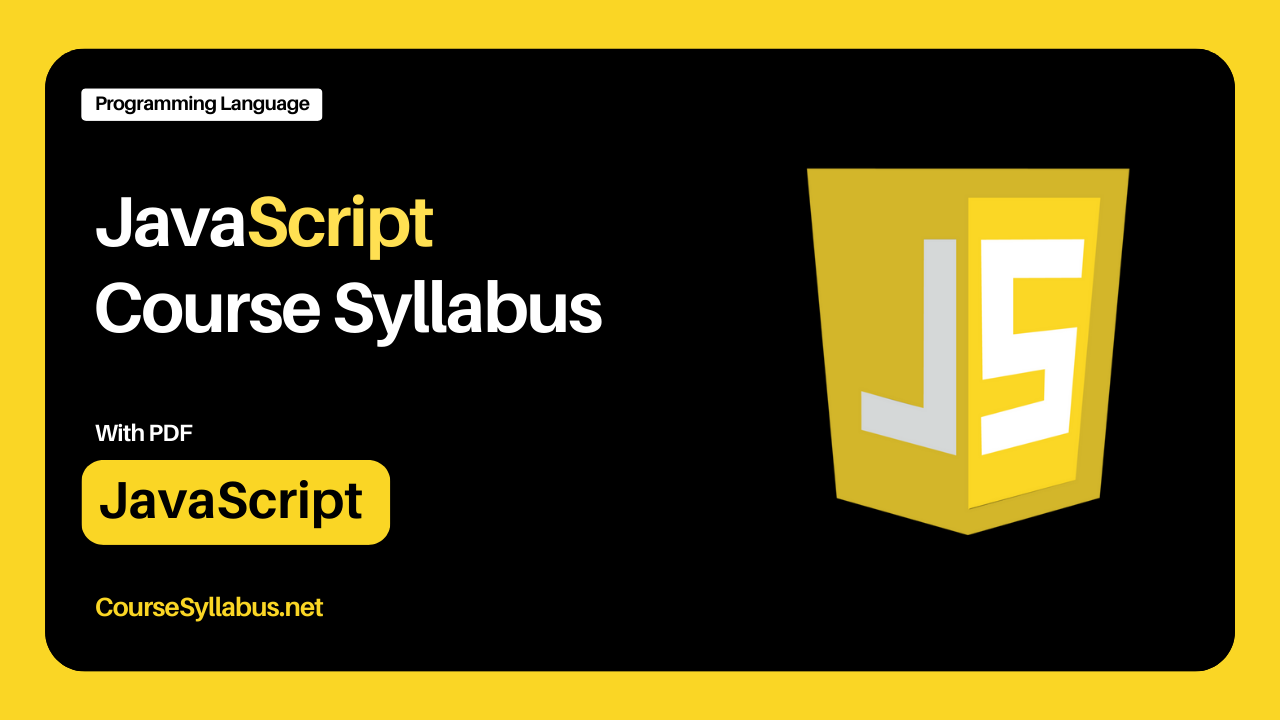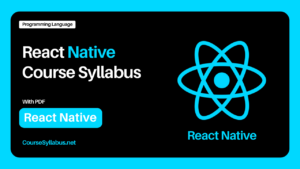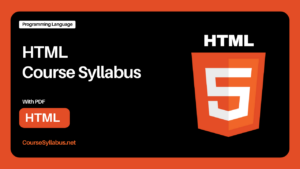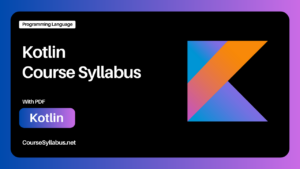JavaScript is a versatile and powerful programming language commonly used for web development. Originally created by Netscape, it has evolved into a fundamental technology for creating interactive and dynamic web content. JavaScript enables developers to add functionality, interactivity, and behavior to web pages, making them more engaging and user-friendly.
One of the key features of JavaScript is its ability to run directly in the browser, allowing for client-side scripting. This means that JavaScript code is executed on the user’s device, enabling dynamic updates and interactions without the need to communicate with the server. As a result, JavaScript plays a crucial role in creating responsive and interactive user interfaces.
JavaScript Course Syllabus
Module 1: Introduction to JavaScript
- Overview of JavaScript
- History and evolution
- Setting up development environment
- Basic syntax and data types
- Variables, constants, and operators
Module 2: Control Flow and Functions
- Conditional statements (if, else, switch)
- Loops (for, while, do-while)
- Functions and function expressions
- Parameters and arguments
- Return statements and function scope
Module 3: Arrays and Objects
- Introduction to arrays and objects
- Array methods (forEach, map, filter, reduce)
- Object properties and methods
- Manipulating arrays and objects
- JSON (JavaScript Object Notation)
Module 4: DOM Manipulation
- Introduction to the Document Object Model (DOM)
- Selecting and manipulating DOM elements
- Event handling
- Creating, modifying, and deleting DOM elements dynamically
- Working with forms and form validation
Module 5: Asynchronous JavaScript
- Understanding synchronous vs. asynchronous code
- Callback functions
- Promises and asynchronous programming
- Fetch API for making HTTP requests
- Error handling in asynchronous code
Module 6: ES6 and Beyond
- Overview of ES6 (ECMAScript 2015) features
- Arrow functions
- Template literals
- Destructuring assignment
- Classes and inheritance
- Modules (import/export)
Module 7: Functional Programming Concepts
- Introduction to functional programming
- Pure functions and side effects
- Higher-order functions
- Immutability and immutability techniques
- Function composition and chaining
Module 8: Error Handling and Debugging
- Common JavaScript errors and debugging techniques
- Using browser developer tools
- Debugging with console.log and breakpoints
- Error handling strategies (try-catch)
Module 9: Regular Expressions
- Introduction to regular expressions (regex)
- Basic syntax and pattern matching
- Using regex in JavaScript
- Common use cases for regex
Module 10: Introduction to Node.js
- Overview of Node.js and server-side JavaScript
- Installing Node.js and npm (Node Package Manager)
- Writing and running Node.js scripts
- Creating a simple server with Node.js
- Introduction to npm packages and package.json
Module 11: Introduction to Express.js
- Overview of Express.js framework
- Setting up an Express.js project
- Routing with Express.js
- Middleware and request processing
- Handling requests and responses
Module 12: Data Persistence with MongoDB
- Introduction to MongoDB (NoSQL database)
- Installing and setting up MongoDB
- CRUD operations (Create, Read, Update, Delete) with MongoDB
- Connecting Express.js with MongoDB
- Building a RESTful API with Express.js and MongoDB
Module 13: Authentication and Authorization
- Understanding authentication vs. authorization
- Introduction to JSON Web Tokens (JWT)
- Implementing user authentication with JWT
- User registration and login
- Protecting routes and resources with JWT
Module 14: Testing and Debugging Node.js Applications
- Overview of testing frameworks (Mocha, Chai)
- Writing unit tests for Node.js applications
- Mocking and stubbing dependencies
- Debugging Node.js applications
- Continuous integration and testing pipelines
Module 15: Deployment and Performance Optimization
- Deployment strategies for Node.js applications
- Configuring and deploying applications to cloud platforms (e.g., Heroku)
- Performance optimization techniques for Node.js applications
- Load testing and scalability considerations
- Monitoring and logging practices
JavaScript Learning Resources
There are many resources available for learning JavaScript ranging from online tutorials and courses to books and interactive platforms. Here are some popular options:
Time for Learning JavaScript
Basic proficiency: If you’re new to programming, you can expect to spend around 3 to 6 months learning JavaScript basics, including syntax, data types, control flow, and basic DOM manipulation.
Intermediate level: To achieve intermediate proficiency and understand more advanced concepts such as closures, scope, asynchronous programming, and ES6 features, it may take an additional 6 to 12 months of consistent learning and practice.
Advanced skills: Becoming proficient in advanced JavaScript topics such as functional programming, design patterns, and framework/library-specific knowledge (e.g., React, Angular, Node.js) could take several more months or even years of dedicated study and real-world application.
JavaScript Developer Career Opportunities
Front-End Developer: Front-end developers specialize in building user interfaces for websites and web applications using HTML, CSS, and JavaScript. Proficiency in JavaScript is essential for creating interactive and responsive UIs.
Full-Stack Developer: Full-stack developers work on both the front-end and back-end of web applications. JavaScript developers with knowledge of front-end frameworks/libraries (e.g., React, Angular, Vue.js) and back-end frameworks (e.g., Node.js, Express.js) can excel in full-stack development roles.
UI/UX Developer: UI/UX developers focus on creating intuitive and visually appealing user interfaces. JavaScript skills are valuable for implementing interactive UI elements and enhancing user experience.
Mobile App Developer: With frameworks like React Native, JavaScript developers can build cross-platform mobile applications for iOS and Android using their existing JavaScript skills.
Game Developer: JavaScript is increasingly used in game development, especially for browser-based and mobile games. Developers can use frameworks like Phaser.js or game engines like Unity3D with JavaScript scripting.
Web Application Architect: Experienced JavaScript developers may transition into roles as architects, where they design the overall structure and architecture of complex web applications, making strategic decisions about technologies and frameworks to use.
Technical Lead/Engineering Manager: JavaScript developers with strong leadership and communication skills may advance to technical lead or engineering manager roles, where they oversee development teams, guide technical decisions, and ensure project success.
Freelance Developer/Consultant: JavaScript developers can work as freelancers or consultants, offering their expertise to clients on a project basis. This provides flexibility and the opportunity to work on a variety of projects.
Educator/Trainer: Experienced JavaScript developers may transition into roles as educators or trainers, sharing their knowledge through teaching, mentoring, writing tutorials, or creating online courses for aspiring developers.
Entrepreneur/Startup Founder: JavaScript developers with entrepreneurial aspirations can start their own tech companies or startups, building innovative web-based products or services using their JavaScript skills.
Conclusion:
JavaScript offers many job options: front-end, full-stack, UI/UX, mobile, games, architecture, leadership, freelancing, teaching, and starting your own business. It’s versatile and used everywhere, giving developers plenty of chances to succeed and make an impact.




